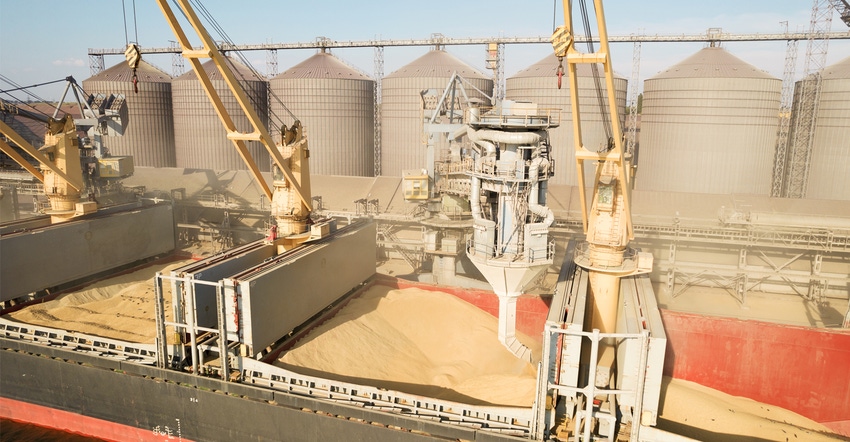
Russia’s invasion of Ukraine in late February has set off ripples in the world’s agriculture and energy sectors.
Rabobank’s global team of economists and industry analysts has been studying how global economic sanctions against Russia, and the conflict itself, may cause ripple effects in the near and long term for farmers and agribusinesses. On a call March 1, three experts from RaboResearch outlined the top trends to watch: Ryan Fitzmaurice, energy commodity strategist; Samuel Taylor, farm inputs analyst; and Stephen Nicholson, global grain and oilseed strategist.
Grains and oilseeds
Russia and Ukraine agricultural production feeds a good chunk of the world’s population. The two countries account for almost 30% of the world’s wheat exports, Nicholson said. They also export 31% of the world’s barley, 31% of the world’s corn and 78% of the world’s sunflower oil.
If you dig into the numbers, Russia and Ukraine typically don’t carry over stocks of wheat and other grains.
RELATED: Russia-Ukraine conflict impact on U.S. agriculture
“They pretty much either use it domestically, or it is shipped out and there’s not much left at the end of the year,” Nicholson said. If war keeps that wheat out of the global markets — whether because farmers can’t physically get into fields or because of sanctions — there are not enough stocks in reserve in the world to make up for the loss, he added.
The market reacted quickly, and wheat prices have hit remarkable highs. Going forward, expect price volatility.
Other considerations:
Supply chain stability. “We’ve seen ADM and Bunge already shut down some of their operations in the Black Sea region,” Nicholson said. “The question is, do those companies go back to that region?” Will they put their supply chain back in danger in the midst of war?
Sunflower oil. Without Russian and Ukrainian sunflower oil, Asian and Middle Eastern countries will need alternatives. Vegetable oil stocks are tight because of renewable diesel and biodiesel demand.
Spring planting. With extensive economic sanctions, the financing situation for Russian farmers is unclear. Will they have financing to plant spring crops? Will Ukrainian farmers be able to get into fields in the middle of fighting?
Great Plains drought. If drought affects the winter wheat crop in the Great Plains, it could mean even higher prices for wheat. But there will be a point when demand starts to contract because of high prices, Nicholson said.
Fertilizer
Russia and Belarus cumulatively account for 40% of global potash production, Taylor explained. Russia accounts for about 22% of global exports of ammonia, the base for nitrogen fertilizers. It also accounts for 14% of global exports of urea and 14% of global exports of MAP, which are used in soybean production.
Big picture, consider Brazil, which needs fertilizers and relies on Russia and Belarus for 46% to 47% of its potash imports.
“And they’re very exposed, both on the urea and also the monoammonium phosphate [MAP] — which is key for their soybean production — to the Russian market as well, at about 20% and 30%, respectively,” Taylor said. That will cause a considerable ripple on the global market as Brazil looks to other nations for its fertilizer needs, and that will lead to huge amounts of price volatility going forward.
Energy
Fitzmaurice said Russia’s 10 million barrels of crude oil may only be 10% of world supplies, but it exports more than half of that overseas. Its extensive pipeline network means Russia controls more than 30% of European oil imports and 35% of European natural gas imports, he said.
“Russia also produces significant amounts of natural gas, both for its domestic use and for export,” Fitzmaurice said. That natural gas flows through an extensive pipeline network to Europe and Asia, as well as through liquefied natural gas export terminals.
As of March 1, energy was specifically carved out of international sanctions, but major energy companies aren’t sticking around in Russia. He said BP and Shell have rushed to divest their Russian joint ventures.
SPECIAL REPORT: Russia-Ukraine conflict impact on U.S. agriculture
What this means for farmers and agribusinesses is a supply disruption on a global scale that could see prices of Brent crude oil moving to upward of $125 a barrel. On the natural gas side, Europe is already competing for supplies with Asia, and pulling Russia out of the mix could cause natural gas prices in Europe to spike to more than $200 a barrel.
“We would expect U.S. prices increasing potentially, with Henry hub finding a new trading range going forward from $4 to, say, $5.50,” Fitzmaurice said, “versus what the markets have been accustomed to in recent years, which is more $2 to $3.50.”
About the Author(s)
You May Also Like






